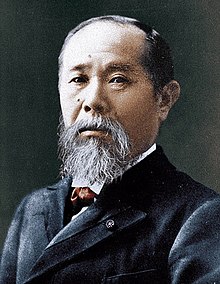Itō Hirobumi
| Itō Hirobumi | |
|---|---|
| 伊藤博文 | |
 |
|
| 1st, 5th, 7th, and 10th Prime Minister of Japan | |
|
In office 19 October 1900 – 10 May 1901 |
|
| Monarch | Meiji |
| Preceded by | Yamagata Aritomo |
| Succeeded by | Saionji Kinmochi (Acting) |
|
In office 12 January 1898 – 30 June 1898 |
|
| Monarch | Meiji |
| Preceded by | Matsukata Masayoshi |
| Succeeded by | Ōkuma Shigenobu |
|
In office 8 August 1892 – 31 August 1896 |
|
| Monarch | Meiji |
| Preceded by | Matsukata Masayoshi |
| Succeeded by | Kuroda Kiyotaka (Acting) |
|
In office 22 December 1885 – 30 April 1888 |
|
| Monarch | Meiji |
| Preceded by | Position established |
| Succeeded by | Kuroda Kiyotaka |
| Resident General of Korea | |
|
In office 21 December 1905 – 14 June 1909 |
|
| Monarch | Meiji |
| Preceded by | Position established |
| Succeeded by | Sone Arasuke |
| Personal details | |
| Born |
16 October 1841 Tsukari, Japan |
| Died | 26 October 1909 (aged 68) Harbin, China |
| Political party |
Independent (Before 1900) Constitutional Association of Political Friendship (1900–1909) |
| Spouse(s) | Itō Umeko |
| Alma mater | University College London |
| Signature |  |
Prince Itō Hirobumi (伊藤 博文?, October 16, 1841 – October 26, 1909, born Hayashi Risuke and also known as Hirofumi, Hakubun and briefly during his youth Itō Shunsuke) was a Japanese statesman and genrō. A London-educated samurai of the Chōshū Domain and an influential figure in the early Meiji Restoration government, he chaired the bureau which drafted the Meiji Constitution in the 1880s. Looking to the West for legal inspiration, Itō rejected the United States Constitution as too liberal and the Spanish Restoration as too despotic before ultimately drawing on the British and German models, especially the Prussian Constitution of 1850. Dissatisfied with the prominent role of Christianity in European legal traditions, he substituted references to the more traditionally Japanese concept of kokutai or "national polity", which became the constitutional justification for imperial authority.
In 1885 he became Japan's first Prime Minister, an office his constitutional bureau had introduced. He went on to hold the position four times, becoming one of the longest serving PMs in Japanese history, and wielded considerable power even out of office as the occasional head of Emperor Meiji's Privy Council. A monarchist, Itō favoured a large, bureaucratic government and opposed the formation of political parties. His third government was ended by the consolidation of the opposition into the Kenseitō party in 1898, prompting him to found the Rikken Seiyūkai in response. He resigned his fourth and final ministry in 1901 after growing weary of party politics, but served as head of the Privy Council twice more before his death.
...
Wikipedia
